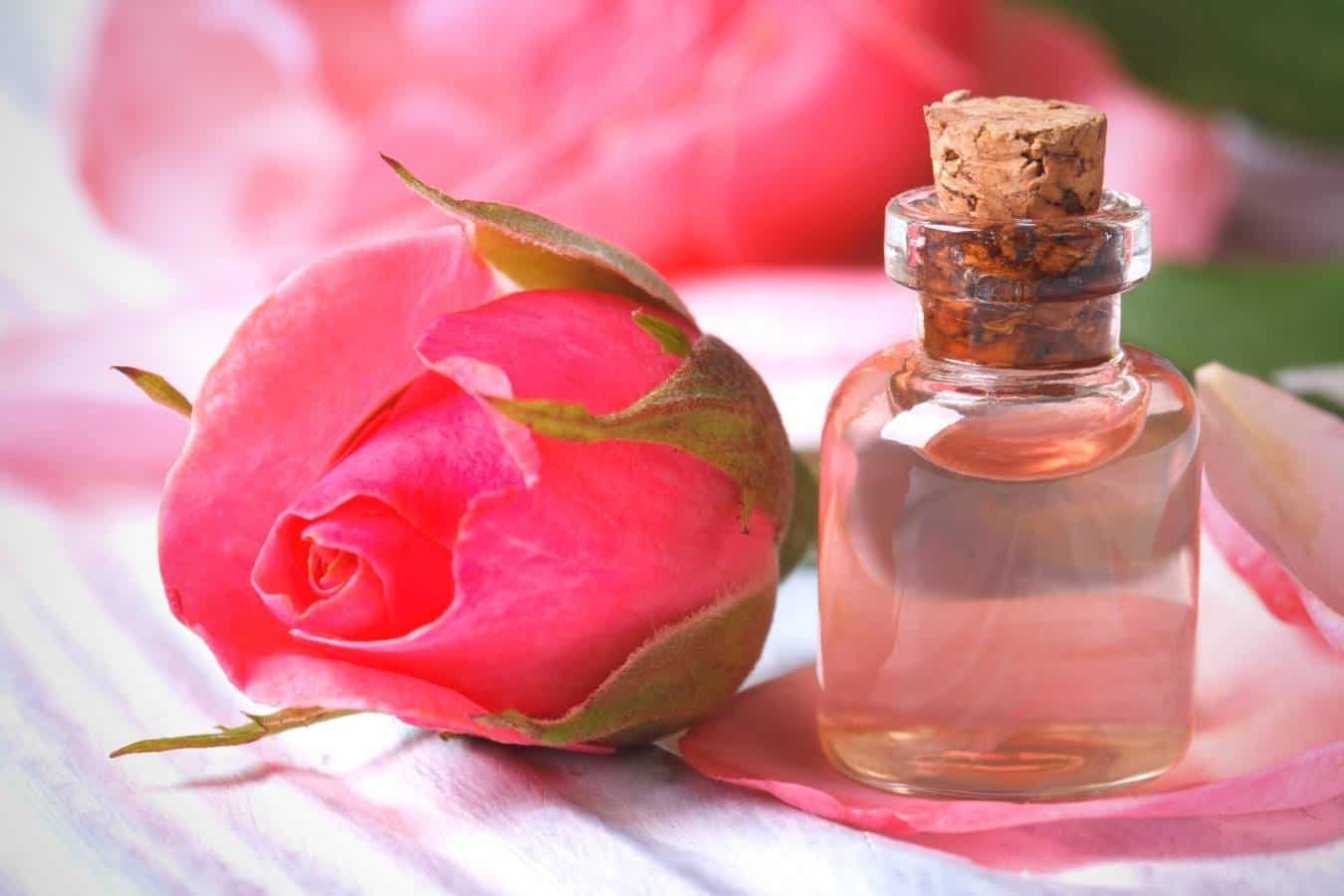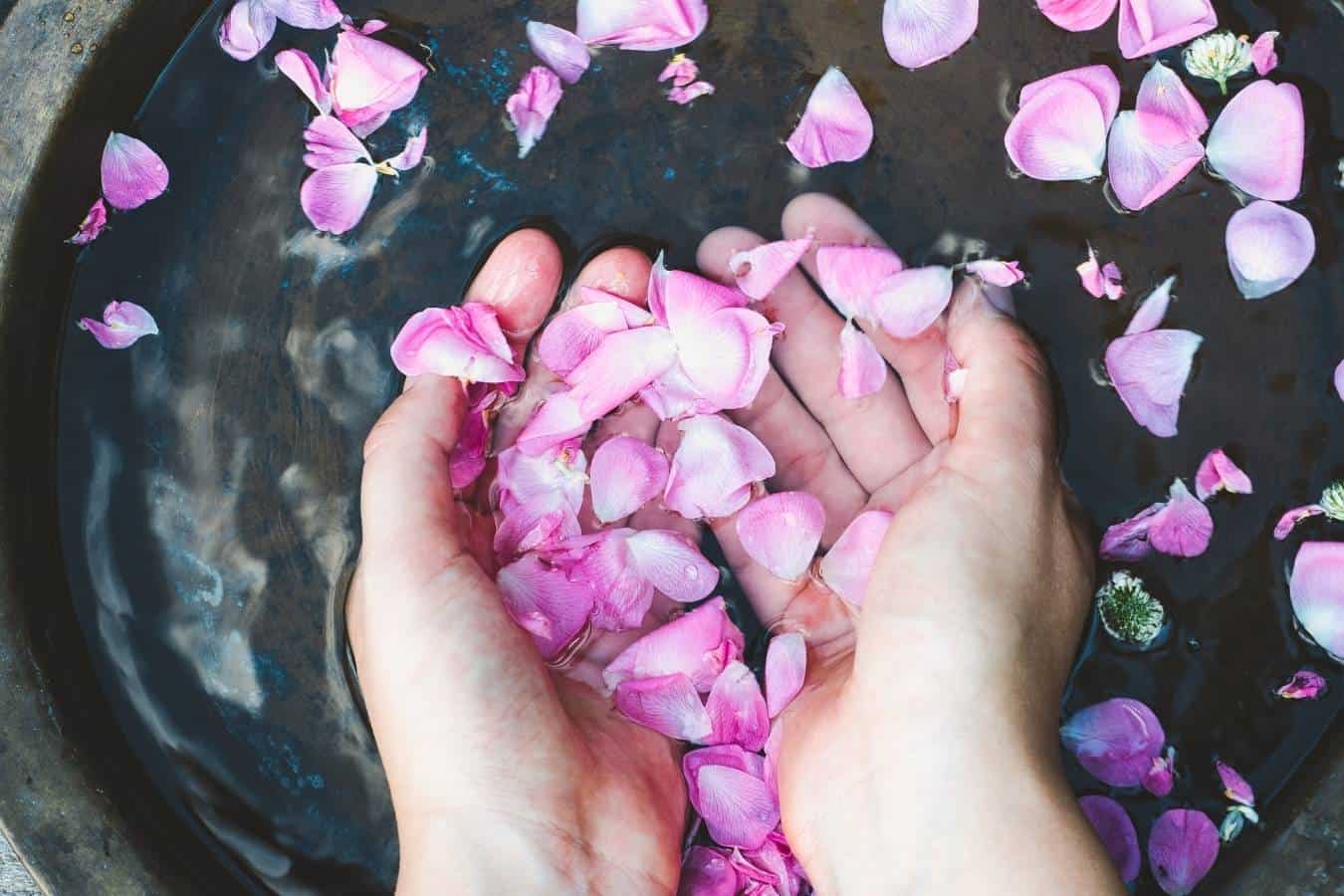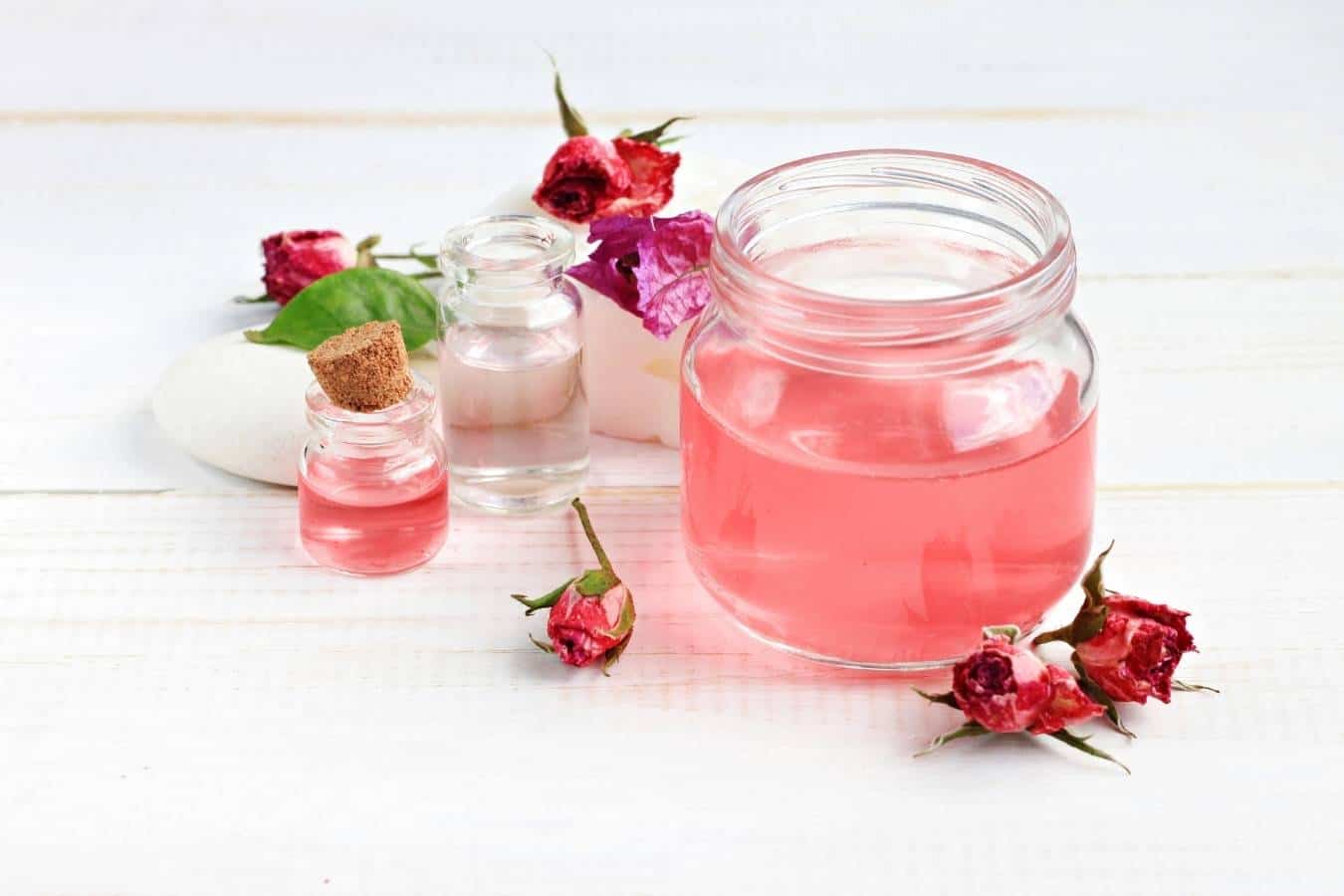Rose water is popular not only in skincare circles but also in the world of haircare. There are various ways to use rose water for hair and in this article, we’ll explore all the benefits of rose water for hair.

Besides a wonderful scent that makes your hair smell good, rose water has anti-inflammatory, moisturizing, and astringent properties. The benefits of rose water for hair include reduced oiliness, a healthy scalp, and soft, shiny hair.
What Is Rose Water?
As the name suggests, rose water is flavored and fragrant water derived from rose petals.
During the extraction process, essential oils and other beneficial compounds in the rose petals are transferred to and become concentrated in the water.
The use of rose water in cosmetics is a tradition that’s been around for centuries in countries like Iran.
Today, rose water is still associated with several benefits for the skin and hair. The benefits of rose water for hair stem from its medicinal properties.
A look at the chemical composition of rose water shows that it contains vitamins, flavonoids, and phenolics.
These compounds have beneficial properties that can potentially boost hair health.
Benefits of Rose Water for Hair

Rose water can provide several benefits to the hair and scalp when applied topically:
Reduces Oiliness
Rose water is a natural astringent, meaning it constricts skin cells.
It reduces the amount of oil produced by the scalp, so your hair won’t feel as greasy.
Rose water is slightly acidic, and this low pH complements the optimum pH for the hair and scalp.
Rose water, therefore, helps create the perfect conditions for the nourishment of hair.
Combats Dandruff Formation
This beneficial effect piggybacks from the ability of rose water to reduce oiliness.
That’s because excessive oil production promotes dandruff formation, so applying rose water to the scalp helps to reduce flakiness.
Soothes Scalp Irritation
Rose water has anti-inflammatory properties that help to soothe scalp irritation.
Rose water also contains vitamins that contribute to a healthy scalp environment.
This is why rose water is often said to help with hair growth. Hair grows best when the scalp is healthy.
In addition, healthy follicles are key to preventing hair loss.
Moisturizes the Hair and Scalp
Misting your hair with rose water helps moisturize and hydrate hair and can also help you fight frizz.
When you moisturize your hair using rose water, it’s easier to manage with the added benefit of a great scent.
Softens Hair
Rinsing your hair with rose water after shampooing can leave you with soft tresses that look shiny and healthy.
The moisturizing effect of rose water makes the hair easy to detangle, which prevents hair breakage.
Ways To Use Rose Water on Hair

You can access the benefits of rose water for hair in the following ways.
- Add to shampoo or conditioner. Add homemade rose water to your hair products to enhance their effectiveness. Alternatively, you can buy shampoo or conditioner that already contains rose water.
- Hair Rinse. You can add rose water in your final rinse after shampooing and conditioning. It’s up to you whether you want to leave it in or rinse after a few hours.
- Rose Mist. Rose water in a spray bottle can be used to moisturize hair on the go, helping you fight frizz and keep your hair smelling good.
- Massage directly onto the scalp. Massage rose water gently into the scalp using a cotton swab. This can help you find relief from dandruff and an itchy scalp.
3 Easy Rose Water Recipes
Distilling Method
What You’ll Need
- Organic rose petals
- Ice
- Glass bowl
- Distilled water
- Large pot with lid
- Strainer
- Sealed container.
Instructions
- Place the glass bowl inside the pot.
- Add the rose petals and water inside the pot all around the glass bowl.
- Cover the pot with the lid, but make sure the lid is turned upside down.
- Place ice on top of the upturned lid.
- Place the water onto a hot plate and simmer.
- Leave until you have collected enough rose-infused condensation in the bowl.
- Pour the rose water from the bowl into a sealable container.
Simmering Method
What You’ll Need
- Organic rose petals
- Distilled water
- Large Pot
- Strainer
- Measuring cup
- Sealable container
Instructions
- Add ½ to 1 cup of fresh petals to the pot.
- Pour enough water to submerge the petals.
- Place the pot on a hot plate at medium heat.
- Bring the water to a simmer, then reduce the heat.
- After 30 minutes, set the pot aside until cool.
- Strain the mixture to obtain rose water
- Store the rose water in a suitable container
Crushing Method
What You’ll Need
- Organic rose petals
- Distilled water
- Large pot
- Strainer
- Mortar and pestle
Instructions
- Separate your rose petals into two piles.
- Use a mortar and pestle to crush one pile to extract the juice.
- Mix the crushed juice and crushed rose petals in a glass bowl.
- Leave the mixture for 3 hours or until thick.
- Add the second pile of untouched rose petals and leave for 24 hours.
- Transfer the mixture to a ceramic pot and simmer until you see bubbles.
- Strain the rose water and transfer it to a sealable container.
Things You Need to Know About Using Rose Water
- Organic rose petals offer more benefits when making homemade rose water.
- Steam distillation is a superior method of making rose water and provides more natural benefits.
- Homemade rose water has a shorter shelf life than the rose water sold on the market.
- If you’re buying rose water, avoid products with chemicals, such as parabens, ethanol, and sulfur.
Is Rose Water Beneficial for Hair Growth?
Hair loss is always a worrying symptom of damaged hair.
It’s usually caused by chemical treatments like dyeing or bleaching hair. Also, applying heat to your hair weakens the hair, so it breaks easily.
To help combat this, rose water is often recommended, with most people believing it can combat hair growth.
Rose water also has aromatherapy properties because of its sweet fragrance. It helps to reduce stress and tension.
According to research, nervous stress and tension can lead to hair loss. It appears rose water can counter this, suggesting it could be beneficial for hair growth.
Is Rose Water Suitable for All Hair Types?
Rose water benefits for hair can be experienced by all regardless of hair type.
It’s especially great for hair with low porosity since it increases the absorption of moisture, oils, and products.
When beneficial substances penetrate the hair shaft, low porous hair becomes hydrated, moisturized, and nicely fragrant.
However, although there are no known side effects of rose water, some individuals are allergic.
If you’re not sure about whether you’re allergic, we recommend doing a patch test.
Simply apply rose water to a small section of hair first, then proceed with a full application if the test has negative results.
How Often Should You Use Rose Water?
If you think your hair can benefit from rose water, you probably want to know how frequently you should use rose water for optimum benefits.
Generally, you should use rose water a maximum of two to three times a week. In this case, using rose water daily can do more harm than good.
That’s because excessive use of rose water can affect the pH balance of your hair and scalp, negating any initial benefits you may have experienced.
The trick is to stay patient, and as long as you use rose water in your hair consistently, you’ll likely notice your hair getting healthier after a few months.
Disclaimer: This site is not intended to provide professional or medical advice. All of the content on LovedByCurls.com is for informational purposes only. All advice should be followed at your own discretion. Ingredients may change at any time so always check the product label before using. Check our full disclaimer policy here.
